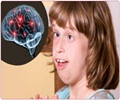A new study has found that video-based therapy for families with babies at risk of autism improves infants' engagement, attention and social behavior.

Jonathan Green, a Manchester University professor of child and adolescent psychiatry, who led the study, said that, "Targeting the earliest risk markers of autism, such as lack of attention or reduced social interest or engagement, during the first year of life may lessen the development of these symptoms later."
People with autism have varying levels of impairment across three areas: social interaction and understanding, repetitive behavior and interests, and language and communication.
The exact causes of the neurodevelopmental disorder are not known, but evidence shows they are likely to include a range of genetic and environmental factors.
As many as one in 50 school-age children in the United States are diagnosed with autism, although some of these will be milder cases. In Europe, the rate is around one in 100 children.
In this study, a specially adapted Video Interaction for Promoting Positive Parenting Programme (iBASIS-VIPP) was delivered to babies aged seven to 10 months who had a higher risk of autism because they had an autistic older sibling.
Advertisement
Advertisement









